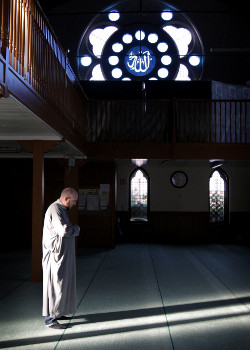Should religious observance be observed in retail?

The recent incident in the UK where a Marks & Spencer Muslim staff member refused to sell alcohol to a customer has opened up a debate about how far retailers should go in their attempts to accommodate workers' religious beliefs. Gillian Hamill reflects on the issues at stake
21 January 2014
‘The customer is always right.’ Or so traditional business thinking would have us believe. However situations are not always black and white – a point in case being when the customer’s needs conflict with the religious beliefs of the staff member serving them.
The recent much-publicised case in the UK whereby Marks & Spencer apologised after a Muslim assistant refused to sell alcohol to a customer is an apt illustration of this thorny dilemma.
The furore which followed the original report in The Telegraph also highlighted the different stance various grocery retailers have decided to adopt on the matter.
Different approaches
Sainsbury’s has said there is no reason why staff who do not drink alcohol or eat pork on religious grounds cannot handle them. Tesco meanwhile has proved a veritable voice of reason on the subject, commenting that it made "no sense" for staff who refused to touch items for religious reasons to work on a till.
An Asda spokesman said the supermarket didn’t have a specific policy in place but added that, "if any colleague had a serious concern about anything then we’d look at that on a case-by-case basis". In a similar vein, Morrisons said it would "respect and work around anyone’s wishes not to handle specific products for religious or cultural reasons".
So although Marks & Spencer is by no means alone in its efforts to accommodate employees’ religious observances, its stance has nevertheless attracted allegations of being ‘political correctness gone mad’.
Customers’ responses
According to The Telegraph, the M&S official Facebook page was deluged by negative comments after the incident was reported and a Boycott Marks & Spencer page created.
Some customers said they thought the policy represented the thin edge of the wedge and asked what would be next. Would vegetarians be allowed to refuse to sell meat products? Would Christian workers be allowed to forbid the sale of ladies garments to transvestites? One customer, Matt Syson, obviously felt particularly passionate about the issue, accusing M&S of creating "division and hatred within our communities".
On the other hand, some commentators praised Marks & Spencer for respecting its staff members’ beliefs. Ian Leslie, writing in the New Statesman said the furore over M&S’s Muslim staff policy shows Islamophobia is a problem in the UK. As he noted: "Nobody is being refused service. The policy isn’t Islam-specific: Jewish employees don’t have to sell pork if they don’t want to. For once, a big employer isn’t coercing anyone to do anything – in fact the opposite."
Right to apologise
Yet whether or not you agree with Marks & Spencer’s policy, the supermarket has apologised – and rightly so – for failing to stick to its own internal guidelines during the incident in question. Had these been adhered to, both the customer and "extremely apologetic" staff member would not have found themselves in the awkward encounter which resulted in the case being reported nationally.
That said, given that the incident appeared to be a once-off encountered during the hectic run-up to Christmas, as opposed to anything even approaching a regular occurrence, it’s safe to say that Marks & Spencer must be careful to ensure such cases don’t occur.
No compromise on customer service
According to a M&S spokesman: "Where we have an employee whose religious beliefs restrict food or drink they can handle, we work closely with our members of staff to place them in suitable roles, such as in our clothing department or bakery in foods.
"As a secular business we have an inclusive policy that welcomes all religious beliefs whether across our customer or employee base. This policy has been in place for many years, and when followed correctly, we do not believe that it should compromise our ability to offer the highest level of customer service. We apologise that this policy was not followed in the case reported."
Dunnes Stores hijab case
Religious differences have also presented problems here in Ireland in the past. In 2012, a woman sued Dunnes Stores for unfair dismissal after she was allegedly told she "couldn’t come to work wearing a hijab". Loreta Tavoraite (35), who is originally from Lithuania, began working in a Dunnes Stores in Ballincollig in Cork in July 2007. She later converted to Islam and for religious reasons wanted to wear a hijab – a headscarf that covers the hair, leaving the face exposed – at work. However Dunnes told the Employment Appeals Tribunal (EAT) in Cork that its staff members all wear a standard uniform.
While there are obviously broader issues of political and cultural integration at play in such scenarios, it is nevertheless hard to argue how a staff member’s ability to do their work would be in any way impeded by wearing a particular garment – especially if worn with the rest of the company’s uniform. In contrast, as M&S acknowledged in its statement, employees being unable to touch particular items obviously has a practical implication in terms of the service customers receive.
Practicality a priority
It is of course, Marks and Spencer’s right as a private business to decide their own staff policy; the only stipulation being that it’s not illegal in any way. And an effort to accommodate staff’s needs to make their working life more manageable or happier in any way, is commendable. A problem only raises its head if the guidelines aren’t followed fully at all times. The customer is this case was inconvenienced by essentially being in the ‘wrong’ queue. She was told she’d have to wait for another staff member to become available.
Unfortunately, when a customer is told they’re not right, any company that wants to project a positive image and improve their bottom line, is almost certainly in the wrong.



 Print
Print





Fans 0
Followers